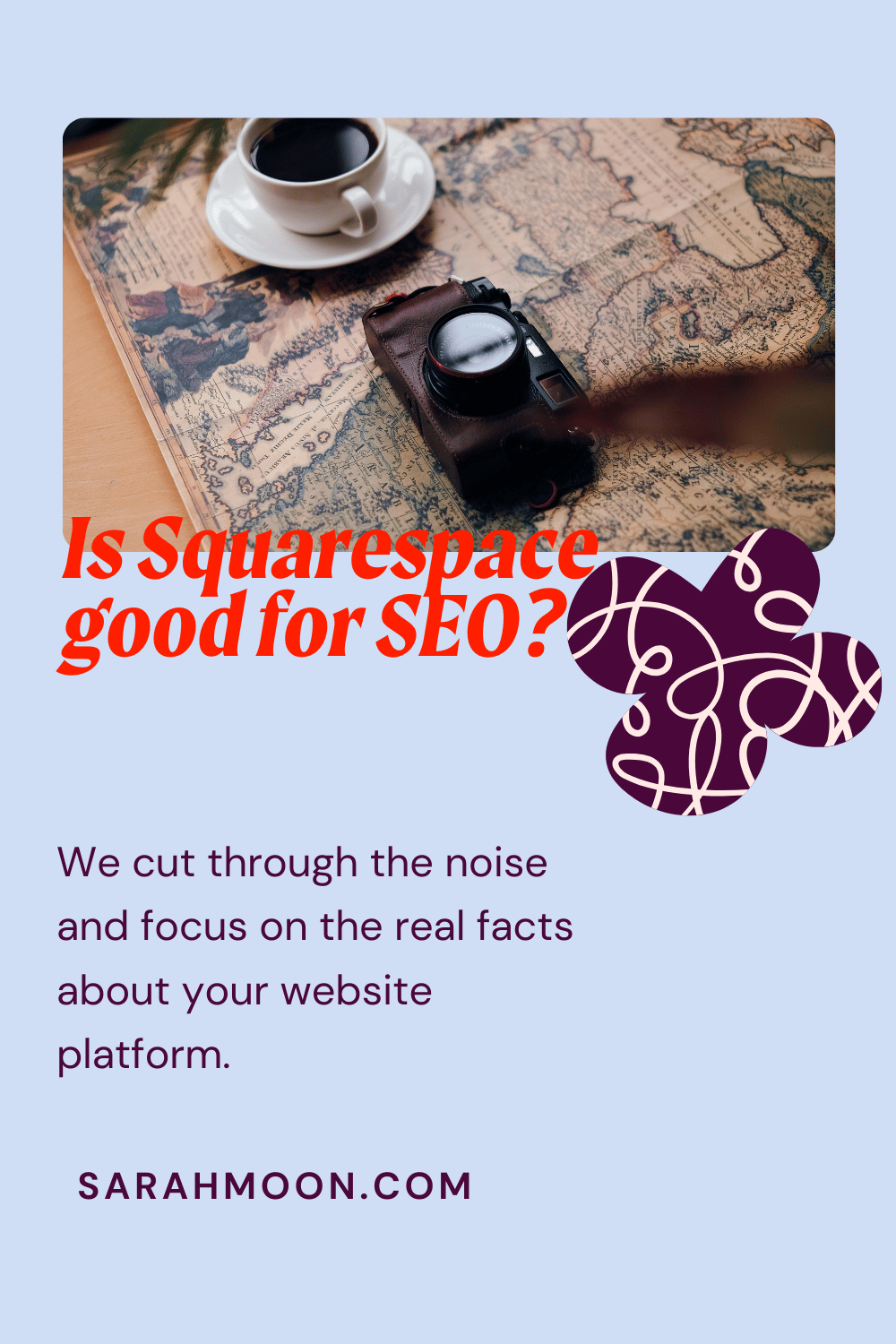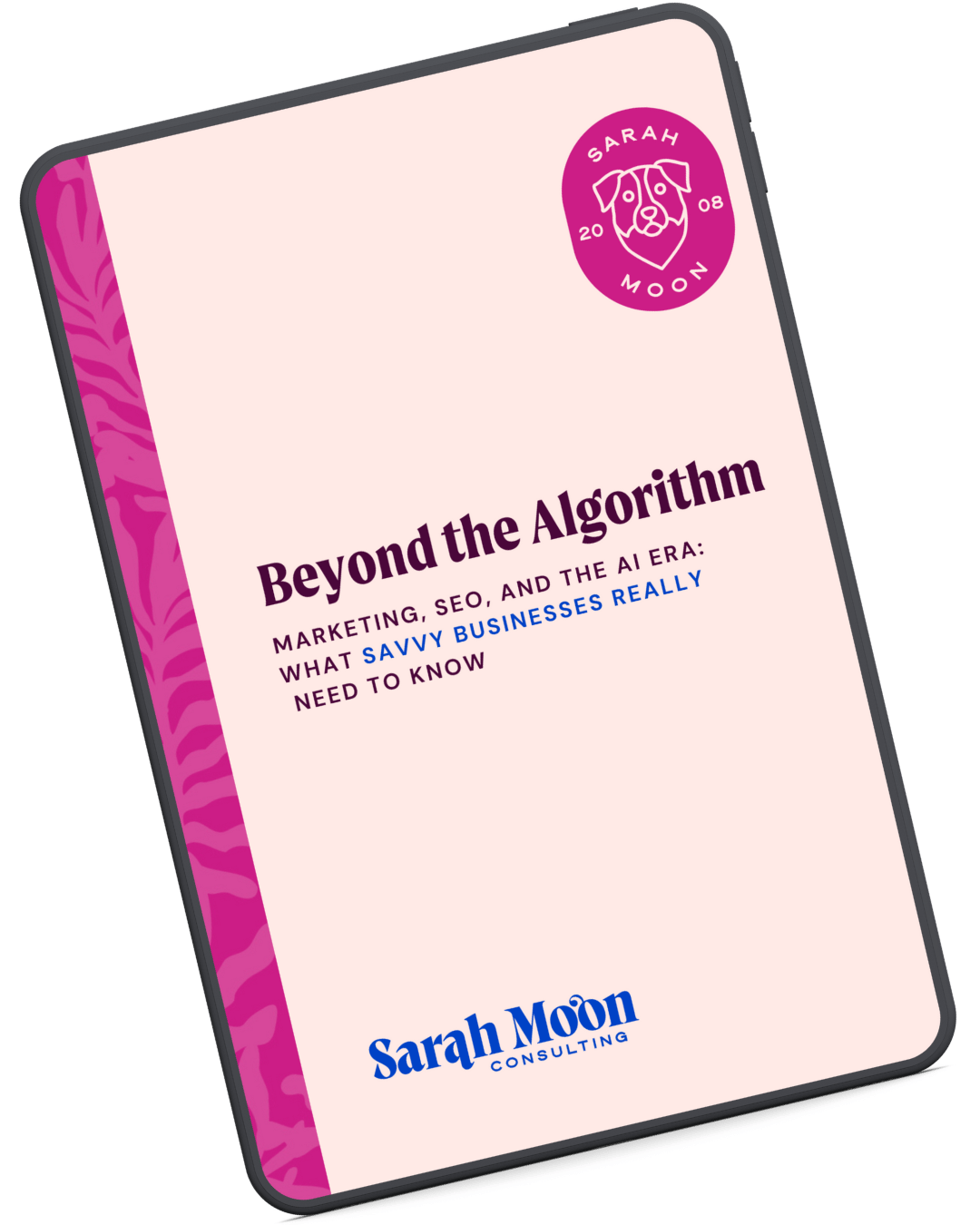Is Squarespace good for SEO? (2025 Update)
Since I began specializing in Squarespace SEO over a decade ago, I’ve fielded questions about the platform’s ability to rank in Google. Because the SEO industry is so dominated by WordPress evangelists, Squarespace users—many of whom have designed their websites themselves—wonder if they’ve chosen a website builder that may keep them from being visible when people search for their services.
So, is Squarespace good for SEO in 2025?
The short answer? Yes!
The long answer? SEO is actually a pretty complicated subject, and your visibility is less dependent on the platform you use for your website than what you choose to actually do with your website.
Let’s break down the facts about Squarespace SEO and what you, a website owner just trying to run your business, needs to know. There’s a lot of misinformation out there, so equip yourself with the facts so you don’t get scammed. (For more of this, read my article about red flags when hiring an SEO agency.)
But first! This is an updated article, the original published all the way back in 2017, with various updates over the years—it was time for a fresh start. If you’re unsure of when to update versus create a new blog post, I have an article for that!
Squarespace SEO Fact #1: Squarespace makes some grandiose claims about SEO. But take those with a grain of salt.
If you’ve poked around their documentation, Squarespace makes the claim that you can essentially be hands off with the technical side of your website’s SEO, which is confusing at best:
“Squarespace has the technical side covered for you — there’s no need to search for plugins or get under the hood.”
— Squarespace SEO Documentation
While this is a true statement—there is no need to plugins and such to implement best practices in Squarespace—it's often interpreted by DIYers and non-technical designers as Squarespace is inherently good for search engines and that they don’t need to do anything to rank when people search for their services.
The reality is, you still need to optimize for technical SEO, implement solid metas (I cover this in my Magnetic Metas course), and implement a smart content strategy. All of this needs to be done by humans and doesn’t happen magically in the backend of Squarespace, I’m sorry to say.
Squarespace SEO Fact #2: You do not need to use a plugin or other tool to optimize a Squarespace site
If anyone tries to sell you on a Squarespace SEO plugin, run away! While WordPress sites needs a plugin like Yoast, the reality is you don’t need it, and leaving this out of the technical equation for your site makes the learning curve much friendlier to many website owners. You just need to understand SEO fundamentals instead of learning to use another app in addition to your website. This removal of an annoying technical barrier can really help businesses owners get their head around dealing with Squarespace SEO.
I know with my WordPress SEO clients they often find themselves frustrated by their SEO plugins because they’re confusing to use, need constant updates, and add a layer of complexity to their websites when they just want to be able to update content easily. I actually have repeatedly made the WordPress community furious at me for arguing the SEO should be a built in functionality in WordPress like it is in every other modern website platform—whoops!
Squarespace SEO Fact #3: Squarespace websites can perform incredibly well in Google.
As of the writing of this article, the Squarespace website you’re on right now has 905 ranking keywords, about ten percent more than it did when I was on WordPress last year.
I have achieved this using my own Alignthority® System of marketing using search data, audience understanding, and a keen eye to user-first language. This is all thanks to creating content—whether pages highlighting my services—or blog posts like this designed to educate my ideal audience about answers to their questions. Sure, there’s a technical checklist we’ve gone through, we’ve optimized our images, made sure our metas are dialed in, and, of course, done keyword research, but in the end, content continues to reign supreme when it comes to SEO.
Get the Free SEO ebook Beyond the Algorithm
When it comes to marketing—especially SEO—there’s a whole lot of noise and not a lot of substance. Let’s fix that.
Squarespace SEO Fact #4: There are technical limitations to the platform—as does nearly every website builder.
Squarespace has some special “quirks” that every user needs to be aware of, including issues of what I call “pseudo pages,” the way certain code loads, and some minor page speed issues. Some of these are solvable with smart no-indexing, while others you can make up for by simply creating content on your website that Google deems “high quality.”
Remember, there are over 200 ranking factors that Google considers when deciding whether or not to show your site to searchers, so if you’re not getting an “A” on a couple, you’re probably fine if you’ve compensated for it with excellent, informative content. (I can hear all the technical SEO specialists yelling at me for this all the way from here—but it’s the truth!)
The crucial piece is being aware of the limitations and creating a plan to compensate for them—it’s absolutely doable for the average business owner as part of your regular marketing strategy!
Squarespace SEO Fact #5: Content Still REigns supreme
I originally wrote an article about this subject all the way back in 2017 and I said essentially the same thing: Your content makes all the difference when it comes to showing up in search engines.
Content is where Squarespace can really shine in terms of search engine optimization. I have plenty of criticisms of Squarespace, namely their pace of development, and limitations if you want to be very sophisticated on the development side, but it is a breeze to add content to your site. And, over and over I tell my strategy clients that regularly-updated, targeted content is crucial if you're wanting to be found by the right audience.
What's the right audience you might ask?
The right audience is problem- or solution-aware people who actually have a good chance of becoming customers or clients.
For example, I have an old blog post that's wildly popular, it's a top ranking post in Google and it gets loads of hits every day, lots of eyeballs on it. However, despite that it's done well for me on paper, it's never lead to single inquiry and has only resulted in may be five email list subscribers. So, while I'm happy that it's a post that serving people well, and it's answering a question people have, in terms of my business objectives, it's an un-targeted post that's doing little more than maybe getting my name in front of a bunch of people who'll never be my client. This type of content is fine, contrary to what a lot of marketers will tell you, there's value in creating a resource just because it's a nice thing to do. But you want to balance that with content that will work for you.
This post is a great example! While, this serves as a nice resource (because it's something I can send people when they email me with this very question), it also targets keywords that I know are a "pain point" or a question mark for my audience of established businesses who want to take steps to grow their own audiences and hop off the social media hamster wheel. You can do this with topic cluster pages on your site and blog posts and start interconnecting all that content to build authority on topics you're targeting.
And you know what this content-fueled search engine optimization has absolutely nothing to do with? The platform.
You can implement this strategy on Squarespace, Wordpress, or a plain HTML page. For real.
Squarespace SEO Fact #6: A lot of SEO pros simply don’t know the system
Squarespace still has a relatively small market share in terms of website builders, with about 3 percent of websites overall. That’s small, despite that Squarespace has close to 5 million subscriptions the last time I looked. And these sites are generally smaller, so the cost to optimize them and plan content for them is smaller.
As a result, for SEO-only agencies they don’t generally prioritize learning Squarespace because the profit just isn’t there for them—they can’t justify taking on the learning to service smaller sites. Plus, since many of these agencies primarily focus only on technical SEO and not content strategy and SEO funnels, which is what most businesses using Squarespace need, they just don’t have the capacity for Squarespace.
Furthermore, the type of businesses that gravitate towards Squarespace for its ease of use generally don’t need long-term SEO contracts or continual optimization—they simply need an SEO project here and there. Again, this doesn’t fit in the business model for most SEO companies, so they don’t take on Squarespace clients.
These factors mean that you want to ignore those cold pitches in your inbox and seek out a great-fit SEO consultant that knows Squarespace, not just Google.
So, to answer that question from the beginning of the post, is Squarespace good for SEO?
It all depends on what you do with your Squarespace website.
If you simply build the site and walk away and guess at your keywords, the cynics are right, Squarespace will be not great for you in terms of search performance, but it's likely no other platform will be either. I've seen loads of WordPress websites with SEO plugins installed and they haven't been used correctly or even not at all.
If you craft a well-researched website that targets your ideal audience and commit to a content marketing strategy, however? Then Squarespace may be just the ticket.







Did your Google Business Profile lose its Q&As? Here's why and how to mitigate this change.